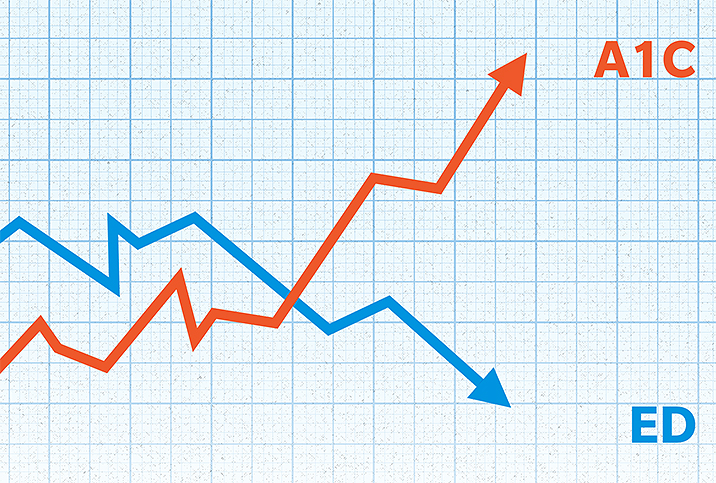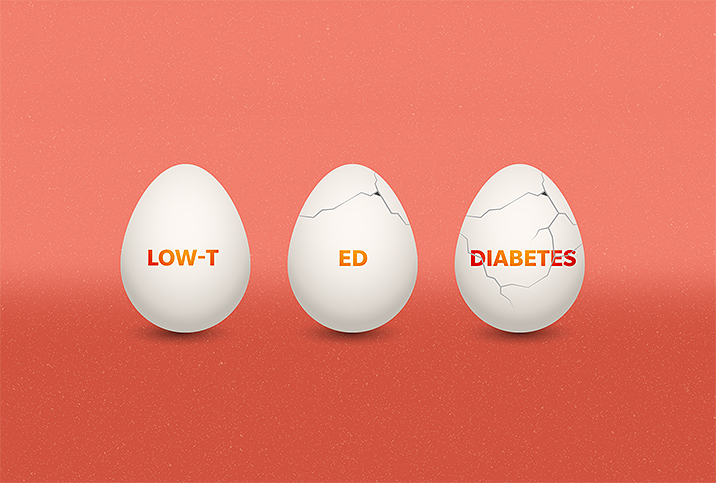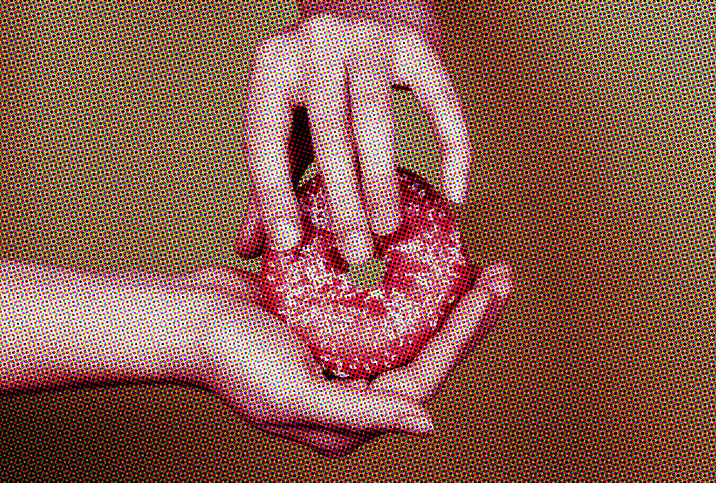When A1C Is Up, Erectile Function Is Down

The more we learn about sugar and how it affects the human body, the more it looks like "The Simpsons" was, once again, way ahead of its time.
In a 1994 episode, Homer comes into possession of a mountain of sugar when a truck overturns. Naturally, our hero is transformed into a paranoid, power-hungry Scarface of Sweets—at least in his own mind.
"In America," Homer pontificated, "first you get the sugar, then you get the power, then you get the women."
As silly as the episode is, the notion of sugar as an addictive substance much like cocaine—one with dire physical and psychological consequences for those who abuse it—isn't far off from what studies demonstrate today, at least when it comes to one condition.
Some 14 million men have been diagnosed with diabetes in the United States, along with an estimated 3.9 million who are undiagnosed, according to the 2020 National Diabetes Statistics Report from the Centers for Disease Control and Prevention. What's worse, about 37.4 percent of U.S. adult men have prediabetes.
For men battling diabetes, even minor changes in blood sugar levels can affect various physiological systems and cause multiple problems, including erectile dysfunction. That's why it's essential to understand how doctors evaluate your glucose levels, most importantly by using the A1C test.
What tests check for diabetes?
Determining your blood sugar level isn't like inserting a dipstick into a car to check the oil. When your doctor evaluates you for diabetes or prediabetes, blood glucose is measured in a variety of ways:
- Fasting blood sugar test. After fasting (not eating) overnight, your blood sugar is tested to see if it's above 99 milligrams per deciliter (mg/dL). A level between 100 and 125 mg/dL indicates prediabetes, and a level higher than 125 mg/dL indicates diabetes.
- Glucose tolerance test. After the fasting blood sugar test, you drink a beverage containing sugar, and your blood glucose level is checked each hour afterward for two or three hours to see how your body responds. After two hours, 140 mg/dL or lower is considered normal, 140 to 199 mg/dL signals prediabetes and 200 mg/dL or higher indicates diabetes.
- Random blood sugar test. This test takes place anytime, whether you're fasting or not. A blood glucose level of 200 mg/dL or higher indicates diabetes.
What's different about the A1C test?
While the above tests are valuable tools that help your doctor determine whether you have diabetes, the A1C test is considered the gold standard. This simple blood test looks at your average blood sugar levels over the past three months, not simply what it is at a specific moment.
Sugar in the bloodstream attaches to hemoglobin, a protein in red blood cells. The A1C test measures the percentage of red blood cells with hemoglobin coated with sugar. Above-normal A1C levels indicate diabetes.
"Hemoglobin A1C is a form of hemoglobin that is generated when you have prolonged exposure to high glucose levels," said Richard Heppe, M.D., who practices at the Urology Center of Colorado in Denver. "So it gives you better information about what somebody's glucose control is over time."
With the A1C test, if you've been naughty over the past weeks and months, your doctor is going to be able to spot it—even if you swear off sweets the day before. As Heppe explained, if a doctor checks someone's glucose level, they know what it is right then, but it's more valuable to know what it's been over the past three months. Simple factors can affect a real-time glucose level.
"You may have had a donut this morning, so your glucose level is high," Heppe said. "But we don't know if you're generally running high."
How does A1C affect erectile function?
For men, long-term exposure to high blood glucose levels can cause nerve damage that contributes to erectile dysfunction (ED).
"High A1C levels mean the person is either prediabetic or not controlling their diabetes well, and diabetes is one of the biggest causes of erectile dysfunction," said Jesse Mills, M.D., director of the Men's Clinic at UCLA and author of "A Field Guide to Men's Health."
What's more, research shows A1C levels may correlate directly to the severity of ED. While a healthy person has an A1C of less than 5.7 percent, prediabetes falls between 5.7 and 6.4 percent, and diabetes is diagnosed at 6.5 percent and above.
One 2005 study published in the journal BJU International found that of men with hemoglobin A1C levels of less than 8 percent, 50 percent experienced mild ED, while 32 percent had severe erectile issues.
Contrast these figures with those of men who had A1C levels greater than 8 percent: Only 25 percent had mild ED, but the number with severe erectile problems jumped to 46 percent.
How do you control A1C levels and prevent erectile dysfunction?
The study's authors further noted the association between A1C levels and severe erectile issues was most pronounced among men diagnosed with diabetes for six years or longer. This indicates the longer you have high blood sugar levels, the more nerve damage—neuropathy—is likely to occur, causing a greater negative effect on erectile function.
However, if you start thinking long term and try to develop a lifestyle committed to lowering your blood sugar, you can stave off the worst effects of elevated blood sugar levels and diabetes on your erections.
"A1C goes along with diabetes because you get elevated blood sugar with diabetes, and the better you get your blood sugar under control, the less risk you're going to have for erectile dysfunction," Heppe said.
The time to act is now. As Heppe warned, once you've started down the road of damaging the nerves due to high blood sugar, there's no turning back.
"Most likely, once the damage is done, it's not going to get any better," he said.
As with all aspects relating to blood sugar levels and diabetes, there's no magic shortcut for dealing with your A1C levels.
"The best way to manage high A1C is to partner with your doctor to establish a rigorous exercise plan, a calorie-restricted, low-sugar diet and maybe start blood sugar-reducing medications," Mills said.


















